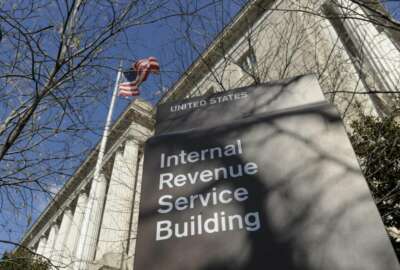
GOP lawmakers, IRS watchdogs disagree on tax gap fix
Members of the House Ways and Means Committee and IRS watchdogs have expressed concerns about the size of the agency’s tax gap — hundreds of billions of dollars...
Members of the House Ways and Means Committee and IRS watchdogs have expressed concerns about the size of the agency’s tax gap — hundreds of billions of dollars that go uncollected each year — but disagree how best to close the gap.
Committee Chairman Richard Neal (D-Mass.) said the IRS has seen its tax return examination workforce shrink by more than 5,000 employees — or nearly 40 percent — over the past seven years, and its staff of revenue officers reduced by about 1,600 employees during the same period of time.
“The amount of the tax gap that the IRS can collect depends on its funding and resources,” Neal said at Thursday’s hearing, adding that a reduction of resources at the IRS has reduced its ability to carry out audits or shrink the annual $458 billion tax gap between what taxpayers owe and what the IRS receives.
Treasury Inspector General for Tax Administration J. Russell George told the committee the number of IRS audits dropped from 1.6 million in 2013 to 1.1 million in 2017 — a 32% decrease. In addition, TIGTA estimates that each revenue office brings in about $2 million annual. With 1,600 fewer revenue officers, George said that’s led to more than $3 billion not getting collected.
“I know most Americans dread the notion of being audited but … that is the most effective way the IRS has to collect revenue,” George said.
James McTigue, the Government Accountability Office’s director of tax and strategic issues, said the IRS has seen an “across-the-board” drop in audits.
“You can only do so much with what you have. At some point, if you do want to increase the audit rate, which has fallen dramatically since 2010, then perhaps it is time to consider additional resources,” McTigue said.
Faced with an increasing workload under the Tax Cuts and Jobs Act, George compared the IRS’s current resources to a “zero-sum game” in which the agency has to borrow resources from another part of its operators in order to roll out changes under the tax reform law or increase staffing to its tax-help phone lines.
“The resources come from a different pot within the IRS, so there’s less money for enforcement officials and what have you,” George said.
However, committee ranking member Kevin Brady (R-Texas) dismissed increasing the workforce and audit rate to shrink the tax gap. Instead, he urged the IRS to improve its taxpayer experience to boost voluntary compliance.
“For starters, we need to make sure the taxpayers are provided with the customer service they deserve. Most Americans want to pay the taxes they owe, but do have a hard time when questions arise and they can’t get through to get help. We need to make it easier,” Brady said.
A provision in the fiscal 2017 spending bill passed by Congress required the IRS to give a comprehensive customer service strategy to the appropriations committees within six months. But two years later, McTigue said GAO has yet to see the strategy.
However, another bipartisan round of legislation might expedite the process. The Taxpayer First Act, which the House passed in April, would also push the IRS to develop a customer service strategy.
Improving taxpayer services
While IRS opened this year’s filing season on time, despite the 35-day partial government shutdown, the lapse in funding had a significant impact on its level of phone service.
During the first week of the season, IRS officials only answered 48 percent of tax-help calls, with an average 17 minute wait time. For the same period the year before, it answered 86 percent of calls with a four-minute average wait time.
“Given the increased volume of questions resulting from the new tax law, I think the IRS managed the best they could,” McTigue said.
While the IRS looks to improve its online services as part of its six-year IT modernization plan it released last month, workforce attrition has also led to the IRS closing the doors on 38 of its 358 taxpayer assistance centers across the country. As a result, the agency now requires taxpayers to schedule appointments instead of seeking walk-in help.
However, IRS Commissioner Chuck Rettig told senators last month that more than half of taxpayers who call to set up an appointment have had their tax questions answered over the phone, or been redirected elsewhere in the agency to resolve their problem.
Rep. Kenny Marchant (R-Texas) urged the agency to continue offering in-person help.
“We have missed that — our constituents have missed the ability to walk into an office,” Marchant said.
Rep. David Schweikert (R-Ariz.) urged the IRS to leverage its huge trove of taxpayer data to track whether consumer spending information matches up with income reported on individual tax returns.
“The reality of it is, if we would allow the IRS to do much more of that type of data mining, it’s not about an FTE count of employees, it’s about technology and the access to that type of information to finding compliance,” Schweikert said.
However, Benjamin Herndon, the IRS’s chief research and analytics officer, said the agency faces an uphill battle attracting and retaining data analytics talent.
“I can say undeniably that this is an organization that could do more with more resources,” Herndon said.
McTigue also pointed to a recent GAO report, which found that the IRS has seen its human capital workforce “atrophied,” leaving the agency with fewer employees to identify skills gaps in the current workforce, or identify what skills would be needed in a future IRS workforce.
Rep. Earl Blumenauer (D-Ore.) said the IRS’s capacity to carry out its mission has been diminished by its budget reductions.
“No other business in America cuts its accounts receivable,” Blumenauer said. “They would go out and collect the bills that are due.”
National Treasury Employee Union President Tony Reardon urged Congress to “reinvest in the men and women of the IRS.”
“The depleted revenue officer corps is yet another illustration of how cutting the IRS budget ends up costing the government way more money than it saves,” Reardon said.
Copyright © 2024 Federal News Network. All rights reserved. This website is not intended for users located within the European Economic Area.
Jory Heckman is a reporter at Federal News Network covering U.S. Postal Service, IRS, big data and technology issues.
Follow @jheckmanWFED
Related Stories





